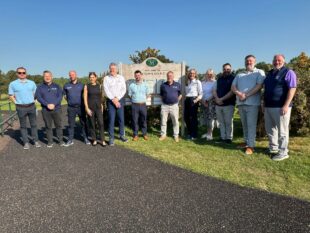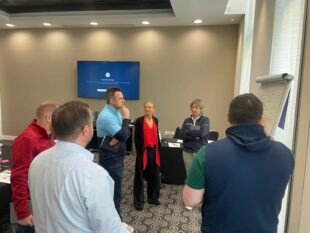As the iGolf scheme enters its third year, England Golf chief operating officer Richard Flint reveals the programme’s significant impact for both golfers and clubs
SIX thousand golfers who signed up for England Golf’s iGolf scheme have now joined clubs, the governing body have revealed.
Marking the second anniversary of the scheme, which gives independent golfers an official handicap in return for an annual fee, England Golf chief operating officer Richard Flint said that 51,000 players were now subscribers.
“It’s a significant number and really beyond what we expected within the first two years,” he said. “It’s been a really positive story about engaging directly with independent golfers but also on that transition into membership.”
The iGolf scheme was controversial upon its launch, with some clubs fearing it would cannibalise existing golf club members. Others refused to consider opening competitions and other benefits to iGolf members.
But Flint said the reality had been very different. Only seven per cent of iGolf subscribers had been a member of a golf club before, while 57% of golfers had played more since subscribing.
More than three quarters of the community said they were highly likely to renew their subscriptions and counties were also now applying for £200,000 in funding released from surplus iGolf revenues.
Has there now been a shift in the perception of iGolf within the wider club landscape?
“I think there has,” added Flint. “I heard the comments – second-class citizens, not real golfers, shouldn’t be allowed to play on a regular basis. These were outrageous.
“I understand there were fears and perceptions but the reality is these are golfers like you and me, like any golf club member.
“The average age is 42. The average [handicap] index is 19. These are people playing on a regular basis. They are golfers wanting to have fun. There is a social element and community. We know some are joining golf clubs.
“I think things have moved on. We’re certainly seeing a sense of golf clubs wanting to embrace iGolf. We’re seeing more golf clubs promoting their opportunities, particularly membership but some are running specific competitions for iGolfers and some are opening up open competitions.
“We’re certainly seeing that perception, and that support, for iGolf. Let’s embrace that and let’s keep making sure we make this sport more inclusive and iGolfers should be part of that message.”
One area where England Golf will continue to focus is on growing the number of women and girl iGolf subscribers. While the number of iGolfers has increased, following a marketing campaign to encourage participation, the percentage has remained static at about four per cent of members,
Flint explained: “The campaign’s been really focused and we’re really pleased with it. In terms of moving the dial, and the percentage, it’s still around four per cent of the total number that’s made up of female subscribers.
“It hasn’t changed the percentage, although there are more female golfers that have joined. We think it’s more of a medium to long term play here. We’ve got to do more. We’ve still got focus on that learning. We’re going to build on the marketing and communications campaign around focusing on that specific audience.”
And on the surplus funding that is being made available to counties from iGolf, he added: “It’s been part of our commitment to engaging with counties and cascading both good governance and inclusivity messages further down our structure. We’ve just invested £200,000 into counties and they have started to apply for that funding.
“We’ve really focused it around any initiatives that can either engage women and girls or junior golf and that wider equality, diversity, framework.
Counties have really embraced that. They’ve started to access that funding. Towards the end of this year, we’ll be producing an impact report just to highlight exactly what the counties have delivered.
“The good thing is that counties aren’t just doing this because there’s funding on the table. They’re already doing a lot of great work. A lot of counties are already linked into our initiatives, such as Girls Golf Rocks and Get Into Golf. It’s just enabling some counties to accelerate that work around grassroots.”
Looking ahead to the next 12 months, where England Golf will hope to have 75,000 iGolf subscribers by the start of the fourth year, Flint said the target was ensuring the sport was opened up to a “different type of golfer”.
“It’s about us being able to that that engagement, communication, and support with them, trying to add more benefits, and trying to create that pathway into membership for those that want it,” he said.
“We’re really pleased with the first two years and we’ve only just started. There are more opportunities and there is lots more growth and, hopefully, more investment we can put back into the game.”



